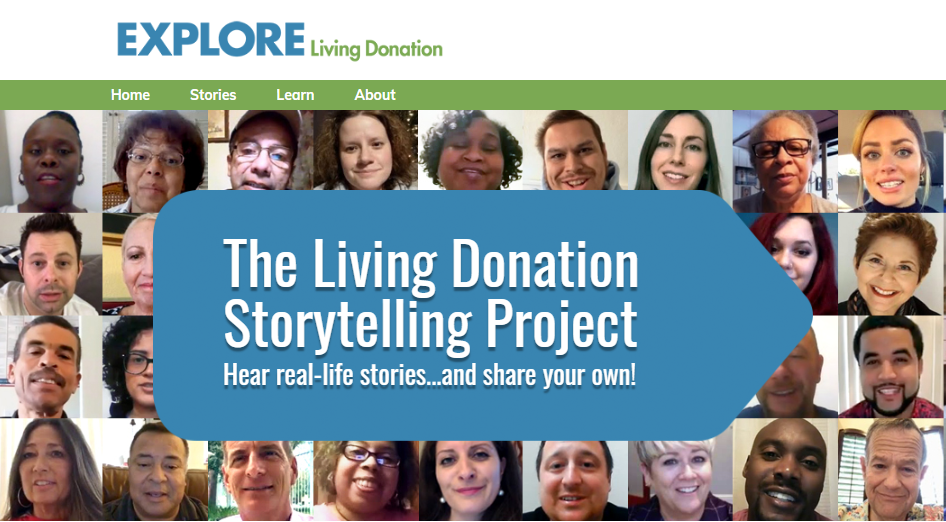By Erica Ho, Research Associate
There are over 740,000 people in the United States living with end-stage kidney disease (ESKD)1,2, but only around 6500 transplants are performed every year due to a severe shortage in available kidneys2. Problems like limited kidney transplant education and medical mistrust make it difficult for enough donors and recipients to be matched3,4. Storytelling has been proven to be an effective strategy in increasing education and awareness for other health issues such as quitting smoking5 and reducing blood pressure6. Therefore, storytelling may also be effective in recruiting and educating more potential kidney donors and recipients.
The Living Donation Storytelling Project is a large collection of stories with the goal of spreading living donor kidney transplant (LDKT) awareness in hopes of helping to solve the United States’ kidney donor shortage. In the recent publication, “A Digital Library for Increasing Awareness About Living Donor Kidney Transplants: Formative Study”, Dr. Waterman and her colleagues show how the digital library can encourage those curious about LDKT to engage with educational material and motivate them to take part in living donation7. The research team recruited a range of people in the transplant community ranging from living donors to patients exploring their transplant options. Out of the 137 storytellers, 130 (94.9%) people reported that they were participating because they wanted to educate the general public about living donation and 110 (80.3%) wanted to spread awareness about living donation to help others. The storytellers were given a tailored list of prompts to answer and were free to skip ones they did not feel comfortable with answering. Before publishing the stories online, the research team carefully watches every video in full and edits out Protected Health Information (PHI) to maintain the privacy of the storyteller. The team also removes inaccurate health information or statements that may make viewers feel pressured or uncomfortable, such as “People who do not give to a family member are selfish.” From the results of this study, the researchers determined that the Living Donation Storytelling Project may be a way to successfully connect with communities that lack health education about LDKT and also introduce a sensitive topic in a more approachable manner.
Although the study was successful in creating a library of stories by recruiting storytellers, it still lacks diversity. The majority of the storytellers are white and female, showing that more work needs to be done to reach out to minorities and males and encourage them to share their stories. More diversity in the library may result in connecting with even more storytellers willing to share their experiences to help shape the future of LDKT awareness. Research on storytelling as an educational tool should also try to find out if certain groups of people avoid the same questions. This could help researchers find out why these people are avoiding certain questions and help create better storytelling prompts in the future. Web-based digital libraries like the Living Donation Storytelling Project may be a practical way to educate more people about not only kidney disease, but other illnesses as well.
Check out our library here! You could tell your own story!
Check out any of the papers we referenced below for more information:
- United States Renal Data System. 2019 USRDS annual data report: Epidemiology of kidney disease in the United States. National Institutes of Health, National Institute of Diabetes and Digestive and Kidney Diseases, Bethesda, MD, 2019. Web site. https://www.usrds.org/2019/view/USRDS_2019_ES_final.pdf. Accessed.
- Executive Summary: Overview of Kidney Disease in the United States. The United States Renal Data System (USRDS). 2018.
- Robinson JK, Friedewald JJ, Desai A, Gordon EJ. Response Across the Health-Literacy Spectrum of Kidney Transplant Recipients to a Sun-Protection Education Program Delivered on Tablet Computers: Randomized Controlled Trial. JMIR Cancer. 2015;1(2):e8.
- Chronic Kidney Disease (CKD) in the United States. The United States Renal Data System (USRDS). . 2016.
- Andrews JO, Felton G, Ellen Wewers M, Waller J, Tingen M. The effect of a multi-component smoking cessation intervention in African American women residing in public housing. Res Nurs Health. 2007;30(1):45-60.
- Nguyen HL, Ha DA, Goldberg RJ, et al. Culturally adaptive storytelling intervention versus didactic intervention to improve hypertension control in Vietnam- 12 month follow up results: A cluster randomized controlled feasibility trial. PloS one. 2018;13(12):e0209912.
- Waterman AD WE, Ranasinghe ON, Faye Lipsey A, Anderson C, Balliet W, Holland-Carter L, Maurer S, Aurora Posadas Salas M. A Digital Library for Increasing Awareness About Living Donor
Kidney Transplants: Formative Study. JMIR Form Res. 2020;4(7):e17441.

